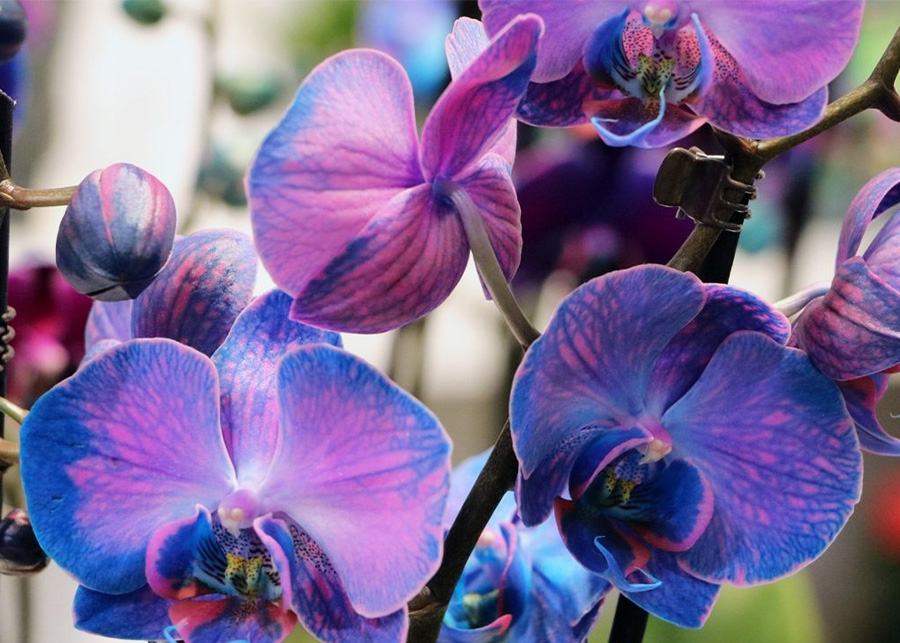Don’t let the myths that orchids are difficult to grow and require a lot of work stop you from adding one or more to your home garden. With a little research, they’re easy to care for, and they can add beautiful color and texture to any setting. In this post, we’ll outline everything you need to know about growing orchids.
Don’t let the myth that orchid care is difficult to deter you from adding one (or more!) to your home garden. Provided you can provide the right growing conditions, orchids are actually easy to maintain and can add beautiful color and texture to any setting. In this post, we’ll outline all you need to know about growing orchids, from choosing the right variety to providing the right care. So read on for everything you need to get started with orchid gardening!
Orchid Care: Essentials
- Knowing your orchid: There are over 800 types of orchids out there. The number of orchid species is increasing each year, making them the most numerous and diverse of all flowering plant families. Some of them are tropic plants, some of them like rocky soil, some of them are resistant to harsher climates… The first thing you should know about orchid care is that what kind of orchid your orchid is.
- Pot selection: Orchids don’t naturally dwell in pots. We do it for our convenience. It’s perfectly acceptable for orchid roots to grow out of the pot. Unfortunately, because our homes are not humid enough for them to thrive, we employ pots to store some of the moisture. Because maintaining a proper moisture balance is so important to orchid success, many orchid growers use transparent pots for easier monitoring of root health. This also allows them to do photosynthesis with their roots as well. Do not put your orchid in a larger pot than necessary. They thrive in smaller pots but there should be enough room for the roots to grow.

- Fertilizer choice: Orchids need special orchid-specific fertilizer in order to thrive. Urea, which is often included in store-bought fertilizer mixtures, is poorly absorbed by orchids. Orchids don’t require a lot of fertilizer; a diluted amount once or twice a month is sufficient for their care. The majority of orchid growers suggest fertilizing a little but every week..
- Watering and humidity: Orchids do not like water that much but they love humidity. That’s why they are often placed on things called “humidity trays.” They collect water in the base for the orchid. There are humidity trays that you can buy from stores but you can use anything to allow the orchid to be hanging above some water. This will make evaporating water reach the orchid directly. On the other hand, watch out for air circulation. If there is not enough air circulation, your orchids will rot. The balance of humidity, water, and air circulation is one of the most important steps of orchid care.
Is orchid care expensive?
It depends on the type of orchid, how much care is required for it, and what you want to do with it. But in general, most people find that an orchid plant is a great addition to any home because they’re relatively low maintenance plants – as long as the person caring for them understands their needs.
Orchid Care: Everything You Need to Know and Do in Conclusion
Orchids are fairly easy plants to care for. When cared for properly, most orchid plants will grow beautifully, at least for a couple of years. If you’ve been thinking about adding an orchid plant to your home, the time is right, and you’ll have the help of this guide to understand how to care for it properly.
F.A.Q
What is the easiest way to care for an orchid?
Ultimately, there’s no one right way to care for an orchid. It all depends on what that particular orchid needs, and whether you can provide it. If your orchid is doing poorly and you don’t know why, even if your methods are otherwise solid, then experiment. Try a different fertilizer. Change the water routine. You never know until you try!
What is best potting mix for orchids?
Monterey bark, fir bark, and perlite are the most common ingredients in orchid potting media. Fir and monterey bark have the greatest ability to hold water in the mix without allowing it to drain away, making them ideal for orchids. Clay pellets absorb water and can swell due to osmosis, which expands and eventually bursts the surrounding medium.
How long do orchids live for?
Orchids are amongst the longest living flowers, but their lifespan varies depending on where you live and how you care for them. Properly caring for your orchids is crucial to extending their lifespans. If you would like to have an orchid plant in your home longer, care for it properly.
